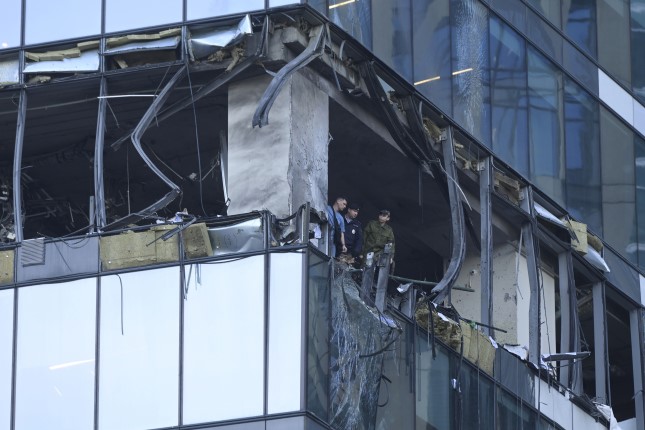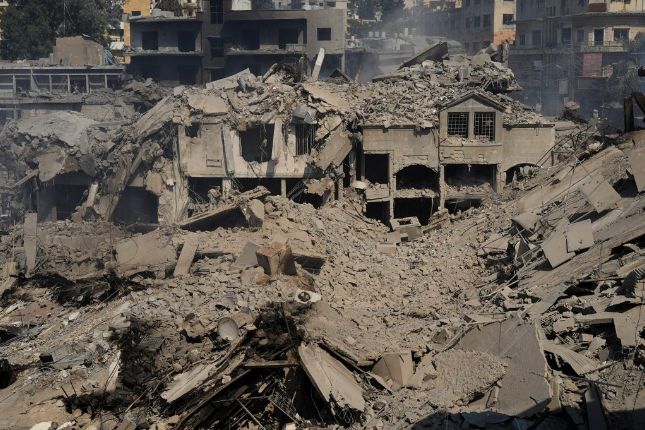The latest drone attack struck a skyscraper in the business district of central Moscow. The 42-story building is home to major Russian companies including VTB Bank and Norilsk Nickel. It was the same skyscraper struck in Sunday’s drone attack.
Russian authorities claimed that the drones that crashed into the building on both strikes had been brought down through electronic jamming.
The unlikeliness of drones that were allegedly downed by Russian defenses striking the same building twice raised widespread questions.
Margarita Simonyan, chief editor of RT, wrote on Telegram, “A drone hitting the same tower for the second time in a row, where three federal ministries are located, at least requires explaining the comments that the electronic warfare downed them all.”
The mayor of Moscow claimed that approximately 1,600 feet of the building’s facade had been damaged. Many of the building’s occupants, including workers at Russia’s Ministry of Economic Development, were told to work from home on Tuesday.
Leonid Slutsky, the chairman of the International Committee of Russia’s parliament, claimed that the drones were likely launched by Ukrainian intelligence operatives working inside of Russia.
Ukraine is increasingly dropping the pretense that it is not carrying out attacks inside Russia. Mykhailo Podolyak, an adviser to Ukraine’s President Volodymyr Zelensky, said, “Moscow is rapidly getting used to a full-fledged war, which, in turn, will soon finally move to the territory of the ‘authors of the war’ to collect all their debts.” He added, “Everything that will happen in #Russia is an objective historical process. More unidentified drones, more collapse.”
After the attack last weekend, Zelensky boasted of the growing costs of the war for the Russian population. “The war is gradually returning to Russian territory—to its symbolic centers and military bases, and this is an inevitable, natural, and absolutely fair process.”
There were indications that the increasingly open strikes deep inside Russia, which Ukraine’s imperialist backers claim to oppose, were causing embarrassment to the NATO powers.
A spokesperson for the European Commission told the Financial Times that the organization has put in place measures to make sure weapons provided by the European powers were used “for the sole purpose of self-defense.”
Asked to comment on the strikes, Farhan Haq, deputy spokesman for the United Nations Secretary-General, asserted that “we are against any and all attacks on civilian facilities and we want them to stop.”
There are indications, moreover, that the war is expanding further in geographic scope. On Tuesday, Poland’s Ministry of Defense claimed that two Belarusian military helicopters violated Polish airspace.
“After the commanders and service chiefs presented conclusions from the analysis of the situation, it was established that today, Aug. 1, 2023, there was a violation of Polish airspace by two Belarusian helicopters that were training near the border,” said the Polish Ministry of Defense.
It continued, “The border crossing took place in the Białowieża area at a very low altitude, making it difficult to detect by radar systems.” The Polish Foreign Ministry said it “expects Belarus to refrain from such actions,” which represent “yet another element in the escalation of tension on the Polish-Belarusian border.” In response, the Polish Defense Ministry ordered additional soldiers to the border region.
Polish officials claimed that they were deploying “additional forces and resources, including combat helicopters,” adding that NATO had been informed of the event.
This was on top of 1,000 troops that were dispatched to the border. Poland said that Belarus’s ambassador was summoned to provide an explanation for the event.
Last week, Poland announced plans to nearly double the size of its army from 172,000 to 300,000.
Belarusian President Alexander Lukashenko said last month that fighters from the Wagner group, who were transferred to Belarus following its June 23–24 attempted coup, wanted to “go on a trip to Warsaw and Rzeszów,” in a veiled threat to attack Poland.
Even as the war expands in scale, the magnitude of the disaster is becoming clear. On Tuesday, the Wall Street Journal published an article headlined, “In Ukraine, Amputations Already Evoke Scale of World War I,” which reported that up to 50,000 Ukrainians have lost one or more limbs since the start of the war.
The Journal wrote, “By comparison, some 67,000 Germans and 41,000 Britons had to have amputations during the course of World War I, when the procedure was often the only one available to prevent death. Fewer than 2,000 U.S. veterans of the Afghanistan and Iraq invasions had amputations.”
Source: World Socialist Web Site.
































